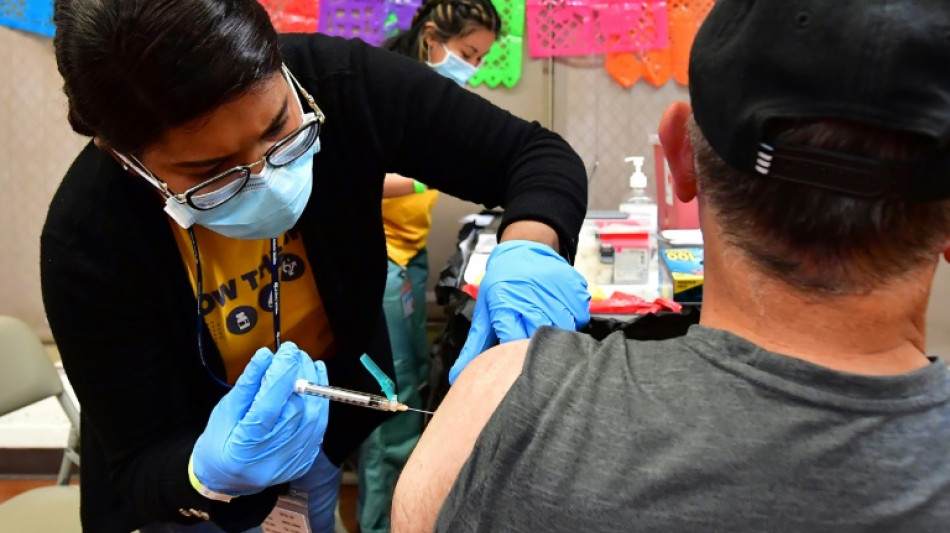
-
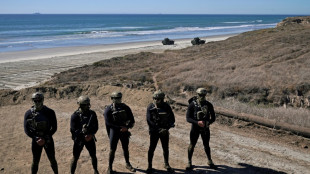 US Navy veterans battle PTSD with psychedelics
US Navy veterans battle PTSD with psychedelics
-
'Unheard of': Dodgers in awe of iron man Yamamoto

-
 UK police probe mass train stabbing that wounded 10
UK police probe mass train stabbing that wounded 10
-
'It's hard' - Jays manager Schneider rues missed chances in World Series defeat

-
 Women's cricket set for new champion as India, South Africa clash
Women's cricket set for new champion as India, South Africa clash
-
Messi scores but Miami lose as Nashville level MLS Cup playoff series

-
 Dodgers clinch back-to-back World Series as Blue Jays downed in thriller
Dodgers clinch back-to-back World Series as Blue Jays downed in thriller
-
Vietnam flood death toll rises to 35: disaster agency
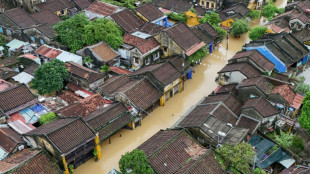
-
 History-making Japan golf twins push each other to greater heights
History-making Japan golf twins push each other to greater heights
-
Death becomes a growing business in ageing, lonely South Korea

-
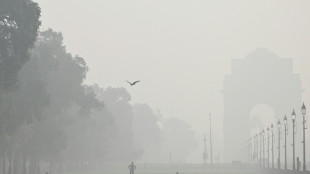 India's cloud seeding trials 'costly spectacle'
India's cloud seeding trials 'costly spectacle'
-
Chiba wins women's title, Malinin leads at Skate Canada

-
 Siakam sparks injury-hit Pacers to season's first NBA win
Siakam sparks injury-hit Pacers to season's first NBA win
-
Denmark's fabled restaurant noma sells products to amateur cooks

-
 UK train stabbing wounds 10, two suspects arrested
UK train stabbing wounds 10, two suspects arrested
-
Nashville top Messi's Miami 2-1 to level MLS Cup playoff series

-
 Fergie, her daughters and the corgis hit by Andrew crisis
Fergie, her daughters and the corgis hit by Andrew crisis
-
'I can't eat': Millions risk losing food aid during US shutdown

-
 High price of gold inspires new rush in California
High price of gold inspires new rush in California
-
'Swing for the fences': Carney promises bold budget as US threat grows
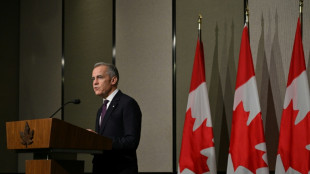
-
 UK police arrest two after 'multiple people' stabbed on train
UK police arrest two after 'multiple people' stabbed on train
-
NBA Hawks lose guard Young for four weeks with knee sprain

-
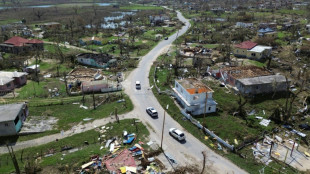 50 dead as Caribbean digs out from Hurricane Melissa
50 dead as Caribbean digs out from Hurricane Melissa
-
Forever Young gives Japan first Breeders' Cup Classic triumph

-
 Mbappe's Real Madrid extend Liga lead, Villarreal move second
Mbappe's Real Madrid extend Liga lead, Villarreal move second
-
Salah savours 'great feeling' after 250th Liverpool goal

-
 Ethical Diamond surges to upset win in $5 million Breeders' Cup Turf
Ethical Diamond surges to upset win in $5 million Breeders' Cup Turf
-
Kinghorn kicks Toulouse to Top 14 summit

-
 Mbappe extends Real Madrid's Liga lead in Valencia rout
Mbappe extends Real Madrid's Liga lead in Valencia rout
-
All Blacks sink 14-man Ireland 26-13 in Chicago Test

-
 World champ Malinin takes lead at Skate Canada
World champ Malinin takes lead at Skate Canada
-
Liverpool snap losing streak as Salah hits 250 goals in Villa win

-
 Salah's 250th Liverpool goal sinks Villa as Arsenal cruise at Burnley
Salah's 250th Liverpool goal sinks Villa as Arsenal cruise at Burnley
-
Morant suspended by Grizzlies after rebuking coaching staff

-
 Spalletti begins Juve tenure with win at Cremonese but Napoli held
Spalletti begins Juve tenure with win at Cremonese but Napoli held
-
Frank refuses to condemn Van de Ven, Spence for snub in Spurs defeat

-
 France superstar Dupont extends Toulouse deal
France superstar Dupont extends Toulouse deal
-
Egypt officially opens grand museum near pyramids

-
 French fraud watchdog reports Shein for 'childlike' sex dolls
French fraud watchdog reports Shein for 'childlike' sex dolls
-
Scotland thrash USA before All Blacks' clash

-
 Five things to know about the Grand Egyptian Museum
Five things to know about the Grand Egyptian Museum
-
Bayern rest stars but ease past Leverkusen before PSG clash

-
 Dead quiet: Paris Catacombs close for renovations
Dead quiet: Paris Catacombs close for renovations
-
Families separated, children killed as survivors flee Sudan's 'apocalyptic' El-Fasher
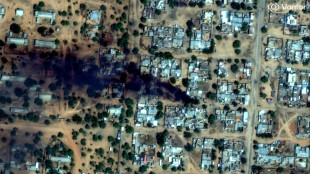
-
 Napoli held by Como as Spalletti begins Juve adventure
Napoli held by Como as Spalletti begins Juve adventure
-
Southampton boss Still vows to fight on as pressure mounts

-
 Borthwick hails 'ball of energy' Pollock as England down Australia
Borthwick hails 'ball of energy' Pollock as England down Australia
-
Egypt opens grand museum in lavish, pharaonic ceremony

-
 Joao Pedro strikes at last as Chelsea edge past Spurs
Joao Pedro strikes at last as Chelsea edge past Spurs
-
Ohtani to open for Dodgers in World Series deciding game seven


One million dead: Five things to know about America's pandemic
One million dead from Covid-19: two years ago it would have been unimaginable, but now the United States is on the verge of surpassing this terrible milestone.
It will be the first country known to do so, although experts warn that the true death toll is likely to be far higher.
Here are five things to know about the US pandemic.
- By the numbers -
One million dead works out to around one in every 330 Americans -- one of the highest death rates in the developed world. Britain has seen around one in 380 people die of Covid, while in France it has been one in 456.
In all, more than 203,000 children in the United States have lost a parent or caregiver, according to a study that underscores the profound impact of the pandemic on American youth.
At the height of the Omicron wave, the United States recorded an average of more than 800,000 cases per day, pushing the total since the pandemic began to nearly 82 million cases.
But this again is probably an underestimate, especially given the lack of tests at the beginning of the pandemic and now the success of self-tests, which are not systematically reported to the authorities.
- New York shuts down -
The virus was first reported in the northwest United States -- but it swiftly reached New York, a global transportation hub, which briefly became the epicenter of the first wave.
The Big Apple went from being the city that never sleeps to a ghost town, with its dead piled into refrigerated trucks and its streets deserted.
Its most affluent inhabitants simply left, while the less privileged confined themselves in cramped quarantines.
The megalopolis has so far suffered more than 40,000 deaths from Covid-19, most of which occurred in the spring of 2020.
- Vaccine rush -
Donald Trump, president when the pandemic hit, was criticized for his slow response, how he played down the scale of the coming disaster, and his contribution to misinformation surrounding the pandemic in the weeks and months to come.
He also launched "Operation Warp Speed," pumping billions of dollars of public money into vaccine research, allowing pharmaceutical companies to conduct expensive clinical trials.
The result? The first vaccines in the US -- from Pfizer-BioNTech and Moderna -- were available in mid-December, less than a year after the first cases were reported in China.
- The mask divide -
In the politically polarized United States, few social issues have been as divisive as masks or vaccines.
Between progressives defending physical distancing, masks and inoculations, and conservatives rejecting any intrusion into their individual freedoms, the battle raged all the way to the top, where Trump only reluctantly wore a mask while his successor Joe Biden scrupulously followed protocols and championed vaccinations.
From schools to airplanes to businesses, the mask issue has led to numerous clashes, sometimes even resulting in violence.
The latest development is that in April, a Trump-appointed judge in Louisiana lifted the requirement to wear masks on public transport, a decision that the federal government has appealed.
- No end in sight -
More than two years since the pandemic reached the United States, the rate of infection is rising yet again, due to sub-variants of the very contagious variant Omicron.
From a low of 25,000 daily cases in March, the country now has a seven-day daily average of some 78,000 cases, according to the main US health agency.
J.Fankhauser--BTB




